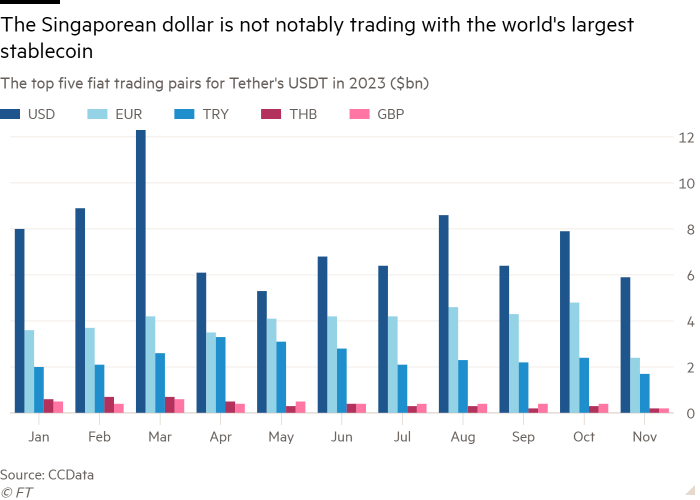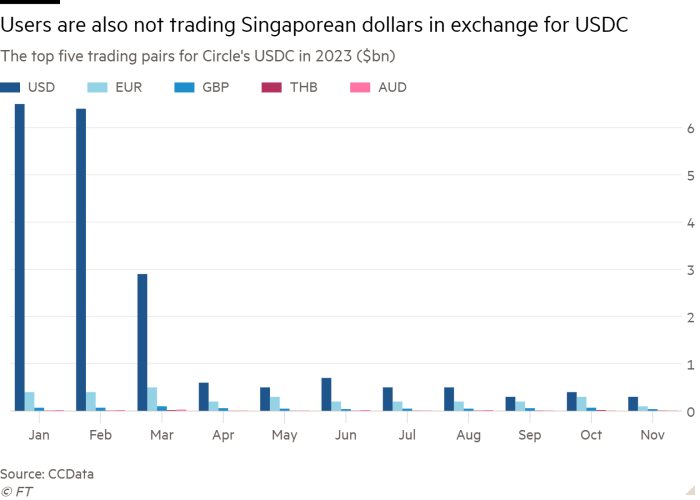Whats up and welcome to the newest version of the FT Cryptofinance e-newsletter. This week we’re looking at a possible new crypto arms race
Singapore has given blockchain agency Paxos an in-principle inexperienced mild to challenge a stablecoin — a form of crypto token pegged to a tough forex.
The agency plans to launch the cryptocurrency by way of its new Singaporean entity. It is going to be pegged to the US greenback and totally backed one for one by the greenback and money equivalents.
Shut followers of the crypto sector will keep in mind Paxos because the issuer behind BUSD, the Binance-branded stablecoin that has light to near-irrelevancy ever since falling foul of New York regulators earlier this year.
However the Paxos approval marks a possible change of fortune for the crypto sector’s document in Singapore, after the collapse of a number of high-profile initiatives within the metropolis state, together with crypto hedge fund Three Arrows Capital and stablecoin operator Terraform Labs.
Singapore state-owned investor Temasek was additionally compelled to put in writing off its $275mn stake in former business bellwether FTX after the trade’s well-known collapse into chapter 11 a 12 months in the past. Temasek has stated its belief in FTX’s former chief government Sam Bankman-Fried — now convicted of fraud and different prices — appeared “misplaced”.
Readers of this article will know that the UK has already laid its stablecoin playing cards on the desk, setting out tips to control the digital tokens in a bid to attempt to facilitate their use as a fee choice for on a regular basis items and providers.
So Singapore’s contemporary embrace of a key digital property market one week later would possibly lead you to consider the worldwide stablecoin arms race is heating up, particularly as the big shadow forged by the US Securities and Trade Fee and its crypto crackdown seems to be right here to remain.
Whereas it’s tempting to recommend that the US’s actions on crypto open the door for the sector to increase elsewhere, the obtainable knowledge doesn’t appear to again up the declare.
There may be little compelling proof to recommend demand exists for dollar-pegged stablecoins in Singapore, and even in Asia as a complete.
Figuring out the components of the world the place stablecoin curiosity is highest is a problem: crypto merchants usually use digital non-public networks, or VPNs, to disguise their location from the prying eyes of regulators or governments that don’t take kindly to crypto buying and selling.
Curiosity available in the market can nonetheless be gauged by measuring the most important buying and selling pairs between the world’s sovereign currencies and largest stablecoins. If, for instance, one of many prime fiat buying and selling pairs for Tether — the world’s largest dollar-pegged token — is the Singaporean greenback, it will be truthful to infer that merchants from town state signify one of many stablecoin’s hottest markets.
However, in accordance with numbers offered by business knowledge platform CCData, the highest 5 buying and selling pairs for Tether’s USDT token are the US greenback and the euro, adopted by the Turkish lira, Thai baht and the British pound.

The outlook for Singapore’s stablecoin push doesn’t enhance whenever you take a look at Circle’s USDC stablecoin, the second-largest token of its variety with roughly $24bn circulating available in the market. Predictably, the US greenback and the euro prepared the ground, trailed this time by the pound, baht and the Australian greenback.

Different notable stablecoins embrace DAI — an algorithmic cryptocurrency very similar to the failed Terra token of 2022 — and BUSD, which, regardless of hemorrhaging market share since its issuance was banned by the New York State Division of Monetary Providers, nonetheless stays the fifth-largest stablecoin available in the market.
Vital buying and selling pairs for these tokens once more supply little encouragement for a metropolis state making an attempt to reassert its grip on crypto markets: the Korean gained, Brazilian actual and Mexican peso all make notable entries for these tokens, whereas the Singaporean greenback is nowhere to be seen.
Paxos’s push into Singapore, in accordance with Paxos’s head of technique Walter Hessert, is fueled by its ambition to “open the monetary system to everybody, introducing important alternatives to world markets and billions of customers”.
However since its $188bn peak in April final 12 months, the stablecoin market cap has fallen roughly 33 per cent to $126bn at this time. So whereas Paxos tries to interrupt new floor in Singapore, it’s doing so in a market that isn’t increasing.
What’s your tackle Singapore’s most up-to-date crypto strikes? As at all times, electronic mail me at scott.chipolina@ft.com.
Weekly highlights:
-
Rebuild or retreat: those are the choices left facing the crypto industry following the downfall of Sam Bankman-Fried. Some indicators level to an business able to relax into gear, together with a possible SEC-approved bitcoin spot ETF. However whenever you zoom out, you discover an business that has been gutted by scandals, a retail market that has not returned, and crypto’s staunchest advocates calling for a “parallel institution”.
-
Crypto media group The Block was offered to enterprise capital agency Foresight Ventures this week, in a transfer that secures the news outlet’s future after its former chief government was proven to have taken secret loans from Bankman-Fried. The Singapore-based investor took a majority stake in The Block: an individual conversant in the matter stated it was investing $56mn for 80 per cent.
-
Bear in mind Twister Money, the crypto platform that had sanctions imposed by the US for allegedly laundering $7bn value of crypto funds for North Korean hackers? Effectively, its customers this week appealed against the US Treasury’s decision to penalise the platform, difficult the federal government’s jurisdictional attain over it. Yesha Yadav, regulation professor at Vanderbilt College, advised me the attraction “makes it clear that there’s a nice deal at stake for decentralised finance”.
Soundbite of the week: US laws can’t repair crypto crime
Throughout a congressional listening to on illicit exercise within the digital property business, president of consulting agency Dynamic Securities Analytics, Alison Jimenez, stated US laws aimed toward reeling within the crypto sector could not shield shoppers towards dangerous actors within the house.
“US laws nonetheless doesn’t change the underlying options of cryptocurrency. I’m involved that we’d have nice guidelines, and if the US establishments comply with them that’s great, however US residents and clients will nonetheless be victims of these exterior organisations which are going to return right here . . . we’d be capable of modify and restrict a few of the points we see inside exchanges however [crypto] isn’t going to cease being a great tool for criminals.”
Information mining: One other faux information value bump
BlackRock’s foray into the crypto house continued this week after the world’s largest asset supervisor filed with the SEC for a spot ethereum trade traded fund.
The worth of ether jumped modestly in consequence, however you may also recall when the worth of bitcoin surged a number of weeks in the past on inaccurate experiences that BlackRock’s utility for one more spot ETF monitoring bitcoin had been accredited by the SEC.
This week, the speculative nature of the crypto market was seen once more when yet one more faked submitting hit the crypto market, this time for a iShares XRP Belief registered in Delaware. A BlackRock consultant advised the FT it had not filed for an XRP Belief, however the value of the XRP briefly surged nonetheless.

FT Cryptofinance is that this week edited by Laurence Fletcher. Please ship any ideas and suggestions to cryptofinance@ft.com.







